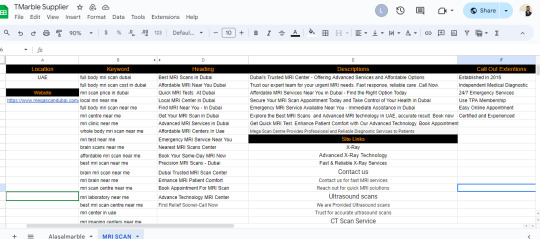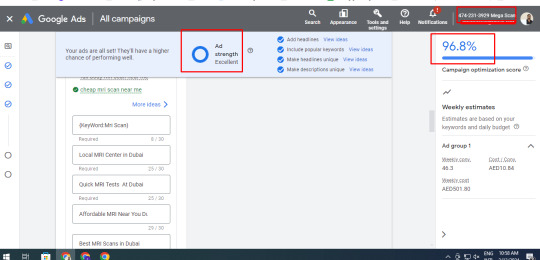#search ads
Text
Sponsored listings are a ripoff…for sellers

Tonight (November 29), I'm at NYC's Strand Books with my novel The Lost Cause, a solarpunk tale of hope and danger that Rebecca Solnit called "completely delightful."

Not all ads are created equally sleazy. The privacy harms from surveillance ads, though real, are often hard to pin down. But there's another kind of ad - or "ad" that picks your pocket every time you use an ecommerce site.
This is the "sponsored listing" ad, which allows merchants to bid to be among the top-ranked items in response to your searches - whether or not their products are a good match for your query. These aren't "ads" in the way that, say, a Facebook ad is an ad. These are more #payola, a form of bribery that's actually a crime (but not when Amazon does it):
https://en.wikipedia.org/wiki/Payola#U.S._investigations_and_aftermath
Amazon is the global champion of payola. It boasts of $31 billion in annual "ad" revenue. That's $31 billion that Amazon sellers have to recoup from you. But Amazon's use of "most favored nation" deals (which requires sellers to offer their lowest prices on Amazon) mean that you don't see those price-hikes because sellers raise their prices everywhere:
https://pluralistic.net/2023/04/25/greedflation/#commissar-bezos
Forget Twitter: Amazon search is the poster-child for enshittification, in which Amazon locks you in (for example, with a year's shipping prepaid through Prime) and then you get recommended worse products while sellers make less money and Amazon pockets the difference.
Sellers who don't sell on Amazon are dead in the water, because most US households have Amazon Prime and overwhelmingly, Prime users start their search on Amazon, and, if they find the goods they're seeking. After all, they've prepaid for shipping.
So sellers suck it up and pay a 45-51% Amazon tax and pass it on to us - no matter where we shop. A lot of the junk fees sellers pay are related to Prime and other fulfillment services, but an increasing share of the Amazon tax comes from the need to pay to "advertise," because if they don't buy the top result for searches for their own products, their competitors' ads will push them right off the first page (those competitors spend money on advertising, rather than manufacturing quality).
There's a lot of YOLO/ROFLMAO in those ads: search for "cat beds" and 50% of the first five screens are ads - including ads for dog products, apparently bought by companies adopting a spray-and-pray approach to advertising. Someone selling a quality product still has to outbid all of those garbage sellers:
https://pluralistic.net/2022/11/28/enshittification/#relentless-payola
This is at the root of Amazon's Pricing Paradox: while Amazon can defend itself against regulators by citing sellers whose prices are lower and/or whose quality is higher, it's nearly impossible for shoppers to get those deals. If you click the top result for your search, you will, on average, pay 29% more than you would if you found the best bargain on the site:
https://pluralistic.net/2023/11/06/attention-rents/#consumer-welfare-queens
What's more, you can't fix this by simply sorting by price, or by reviews, or some mix of the two. The sleaziest sellers have mastered tricks like changing the number of units they sell so the total price is lower. For example, if batteries are normally sold $10 for a four-pack, a sleazy seller can offer batteries at $9 for three units. A lowest-to-highest price-sort will put this item ahead of a cheaper rival.
Researchers found that getting a good deal at Amazon requires that you make a multifactorial spreadsheet by laboriously copy/pasting multiple details from individual listing pages and then doing sorts that Amazon itself doesn't permit:
https://scholarship.law.bu.edu/faculty_scholarship/3645/
There's an exception to this: Amazon and Apple have a cozy, secret arrangement to exclude these "ads" from searches for Apple products. But if you're shopping for anything else, you're SOL:
https://www.businessinsider.com/amazon-gives-apple-special-treatment-while-others-suffer-junk-ads-2023-11
These payola markets are bad for buyers, and they cost sellers a lot of money, but are they at least good for sellers? A new study from three business-school researchers - Vibhanshu Abhishek, Jiaqi Shi and Mingyu Joo - shows that payola is a very bad deal for good sellers, too:
https://papers.ssrn.com/sol3/papers.cfm?abstract_id=3896716
After doing a lot of impressive quantitative work, the authors conclude that for good sellers, showing up as a sponsored listing makes buyers trust their products less than if they floated to the top of the results "organically." This means that buying an ad makes your product less attractive than not buying an ad.
The exception is sellers who have bad products - products that wouldn't rise to the top of the results on their own merits. The study finds that if you buy your mediocre product's way to the top of the results, buyers trust it more than they would if they found it buried deep on page eleventy-million, to which its poor reviews, quality or price would normally banish it.
But of course, if you're one of those good sellers, you can't simply opt not to buy an ad, even though seeing it with the little "AD" marker in the thumbnail makes your product less attractive to shoppers. If you don't pay the danegeld, your product will be pushed down by the inferior products whose sellers are only too happy to pay ransom.

If you'd like an essay-formatted version of this post to read or share, here's a link to it on pluralistic.net, my surveillance-free, ad-free, tracker-free blog:
https://pluralistic.net/2023/11/29/aethelred-the-unready/#not-one-penny-for-tribute
#pluralistic#payola#danegeld#amazon#amazons pricing paradox#consumer welfare#ads#search ads#ecommerce#scholarship#empricism
200 notes
·
View notes
Text
Exploring the Impact of Banned Ads on Google's Search Engine Results

Exploring the Impact
Have you ever wondered about the impact of banned ads on Google's search engine results? Well, in this article, we will delve into this topic and provide you with valuable insights. Let's explore how banned ads can affect the search engine results and what it means for users and advertisers. here you go for google ads agency dubai .
Understanding Banned Ads
Before we dive into the impact, let's first understand what banned ads are. Banned ads refer to advertisements or promotional content that violate Google's advertising policies. These policies are in place to maintain the integrity of the platform and ensure a safe and reliable experience for users.
The Effects on Search Engine Results
When banned ads are detected and removed from Google's advertising network, it can have a significant impact on the search engine results. Here are some ways in which these banned ads can affect the search engine results:
1. Reduced Manipulation - Enhanced User Experience
Banned ads often manipulate search engine results by using misleading keywords or promoting low-quality content. When these ads are eliminated from the advertising network, it helps improve the accuracy and relevance of the search results. This, in turn, enhances the overall user experience by providing more trustworthy and useful information.
2. Decreased Ad Clutter - Improved User Engagement
Banned ads can clutter the search engine results page, making it difficult for users to find relevant information. By removing these ads, Google allows users to focus on genuine search results, increasing their engagement with the content that matters to them. This leads to a more satisfying user experience and potentially higher conversion rates for advertisers whose ads comply with the policies.
3. Boosting Advertiser Trust - Positive Impact on Reputation
For advertisers who follow Google's advertising policies diligently, the removal of banned ads can have a positive impact on their reputation. With a cleaner and more reliable advertising network, advertisers can build trust with their target audience, resulting in increased brand credibility and customer loyalty. This can ultimately translate into higher click-through rates and conversions.
The User's Perspective
From a user's perspective, the impact of banned ads on Google's search engine results is often welcomed. By eliminating misleading and low-quality advertisements, users can have a more positive experience while searching for information or making purchasing decisions. The removal of banned ads helps users trust the search results and rely on the credibility of the displayed content.
The Advertiser's Perspective
While the impact of banned ads on search engine results may seem disadvantageous for advertisers directly involved in such practices, it actually prompts them to adhere to Google's policies more strictly. For advertisers who comply with the rules, the removal of banned ads creates a level playing field, allowing them to compete fairly and gain higher visibility among users interested in their products or services.
Google's Commitment to Quality
Google's commitment to maintaining the quality of its search engine results is evident through its continuous efforts to detect and remove banned ads. The search engine giant regularly updates its policies and algorithms to ensure that users are provided with relevant and trustworthy information.
By prioritizing the user experience, Google encourages advertisers to create high-quality and ethical advertisements. This, in turn, contributes to the overall improvement of the advertising ecosystem, benefiting both users and advertisers.
Conclusion
In conclusion, banned ads on Google's search engine results have a significant impact on both users and advertisers. By removing these ads, Google improves the accuracy and relevance of search results, providing users with a more trustworthy and engaging experience. Advertisers who comply with Google's policies benefit from a level playing field, improved reputation, and increased customer trust.
Google's commitment to quality and fairness ensures that its advertising network remains a reliable platform for businesses to showcase their offerings. As users, we can appreciate the efforts made by Google to provide us with valuable and reliable information while maintaining a safe and user-friendly environment.
So the next time you search for information on Google, remember that the absence of banned ads contributes to a more enriching search experience.
visit megatask web for google ads mangement dubai
3 notes
·
View notes
Text
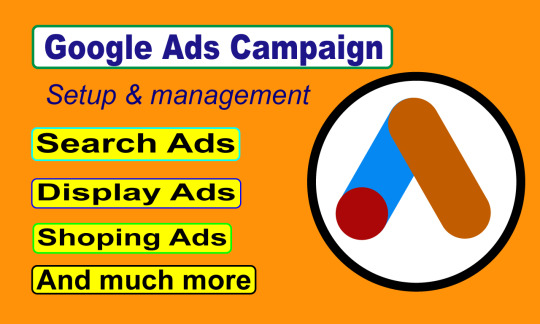
#google ads#google maps#google ads campaign#search ads#display ads#shoping ads#seo services#outsourcing#freelance#online marketing#freelancing#freelancers#business#blogger#blog#seo
3 notes
·
View notes
Text
How to increases High profitable google Ads
Increasing the profitability of Google Ads requires a combination of strategic planning, optimization, and continuous improvement. Here are some tips to help you achieve higher profitability with your Google Ads campaigns:
Set Clear Goals: Define specific and measurable goals for your Google Ads campaigns. Whether it's increasing sales, generating leads, or driving website traffic, having clear objectives will guide your efforts.
Keyword Research: Conduct thorough keyword research to identify relevant and high-converting keywords for your business. Use tools like Google Keyword Planner to find keywords with a good balance of search volume and competition.
Ad Copy Optimization: Write compelling and relevant ad copy that highlights the unique selling points of your products or services. A well-crafted ad can attract more clicks and improve your click-through rate (CTR).
Landing Page Optimization: Ensure that the landing page your ads lead to is relevant, user-friendly, and optimized for conversions. The content, design, and call-to-action should align with the ad's messaging.
Targeting: Use Google Ads' targeting options effectively to reach your desired audience. You can target based on location, demographics, interests, and behavior to ensure your ads are shown to the right people.
Bid Management: Monitor your bids regularly and adjust them based on performance. Focus your budget on keywords and campaigns that are driving the best results.
Ad Extensions: Utilize ad extensions to provide additional information and encourage more engagement. Extensions like site links, call extensions, and callout extensions can improve ad visibility and click-through rates.
Quality Score Improvement: Google's Quality Score influences ad position and cost per click. Improve your Quality Score by optimizing ad relevance, landing page experience, and expected click-through rate.
A/B Testing: Continuously test different ad variations, headlines, and call-to-action phrases to identify what works best for your audience. A/B testing can lead to significant improvements in ad performance over time.
Negative Keywords: Regularly review your search terms report and add irrelevant or low-performing keywords as negative keywords. This helps prevent your ads from showing for irrelevant searches and can save you money.
Conversion Tracking: Implement conversion tracking to measure the success of your campaigns accurately. Knowing which keywords and ads lead to actual conversions allows you to optimize your budget effectively.
Competitive Analysis: Keep an eye on your competitors' strategies and adjust your approach accordingly. You may discover opportunities or areas for improvement by understanding their tactics.
Budget Allocation: Allocate your budget based on the performance of your campaigns. Focus more on campaigns that bring higher returns on investment (ROI).
Seasonal Adjustments: If your business experiences seasonal fluctuations, adjust your ad strategy to capitalize on peak seasons and reduce spending during slower periods.
Remarketing: Implement remarketing campaigns to target users who have previously visited your website but did not convert. Remarketing can be a cost-effective way to re-engage potential customers.
Remember that successful Google Ads campaigns require continuous monitoring, optimization, and adaptation. Keep testing and refining your strategies to stay ahead of the competition and maximize profitability.
#google Ads#Google Adwords#digital marketing#google ads#search engine optimization#search engine marketing#SEM#fixgooglemerchant#googlemerchant#conversion#sales ads#Search ads
3 notes
·
View notes
Link
Know about creating and optimizing dynamic search ads to get good quality conversion and CPC.
#search ads#google ads#ppc advertising#PPC Marketing#Search Engine Marketing#Digital Marketing Strategy
2 notes
·
View notes
Text
5 notes
·
View notes
Text
Understanding the Differences: Google Display Network vs Search Network
The Understanding between the Difference of Google Display Network vs Search Network product is a comprehensive guide that aims to provide users with a clear understanding of the distinctions between the Google Display Network (GDN) and the Google Search Network (GSN). This informative resource delves into the intricacies of these two advertising platforms, highlighting their unique features, advantages, and best practices for effective utilization.
#Google Display Network#Search Network#PPC Advertising#Digital Marketing#Online Advertising#LevyconIndia#Ad Campaigns#Targeted Ads#Display Ads#Search Ads#Ad Networks#Ad Words#Ad Placement#Ad Targeting#Ad Formats#Ad Performance#Ad Reach#Ad Visibility#Ad Relevance#Ad Conversion#Ad Metrics#Ad Optimization#Digital Advertising#Online Marketing#Audience Targeting#Keyword Targeting#Ad Budgeting
0 notes
Text
Ask on WhatsApp: +8801719461325
I will setup and optimize google ads ppc campaign, google ads campaign
#ppc#adwords#google campaign#google ads campaign#optimized#youtube ads#ads campaign#google ads setup#paid search#ppc campaign#search ads#sem#google ads ppc#google search#advertizing#internet marketing#pay per click#create ads#google adwords#adwords management#adwords optimization#digital marketing#google search ads#google ppc#ad copy#ad copy writing#conversions#google tag manager#google ads (30)ppc (22)adwords#setup google ads
1 note
·
View note
Text
Is Google Ads Hard to Learn?
Yes, Google Ads is hard to learn, in general. But with the right mindset and learning resources, it's definitely possible to get into the game confidently.
Let me break it down for you.
Learning Google Ads:
1. First of all, what is Google Ads?
It's an online advertising platform developed by Google, where advertisers bid to display brief advertisements, service offerings, product listings, or videos to web users.
In a nutshell, it's a way for businesses to reach their target audience and promote their products or services.
2. Now, let's dive into the learning process. To get started with Google Ads, you'll need to set up an account.
It's a fairly straightforward process that involves creating an account, selecting your advertising goals, and setting up your billing information. In fact, there are easy instructions as you follow.
3. Once you've set up your account, the next step is to understand the different campaign types available in Google Ads.
There are several options to choose from, including Search Network campaigns, Display Network campaigns, Shopping campaigns, Video campaigns, and App campaigns.
Each campaign type serves a different purpose and targets a specific audience.
Google Ads Campaign Structure:
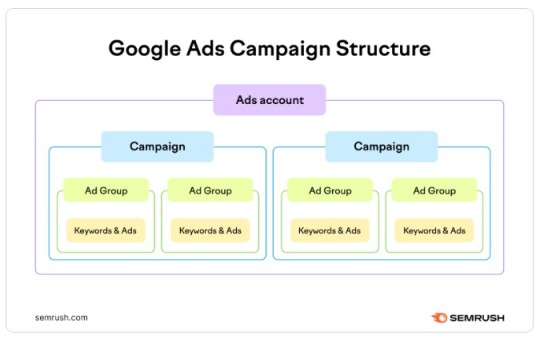
4. To create successful Google Ads campaigns, it's crucial to understand your target audience and their search behavior.
This involves conducting keyword research to identify relevant keywords that your potential customers are likely to use when searching for products or services similar to yours.
You'll also need to craft compelling ad copy that grabs attention and entices users to click on your ads.
5. Tracking the performance of your Google Ads campaigns is essential for optimizing your results.
Google provides various metrics and tools to help you measure the success of your ads, such as click-through rate (CTR), conversion rate, cost-per-click (CPC), and return on ad spend (ROAS).
By analyzing these metrics, you can make data-driven decisions and adjust your campaigns accordingly.
6. One of the great things about Google Ads is its flexibility. You have control over your budget and can set daily or monthly spending limits.
Additionally, you can target specific locations, languages, devices, and even specific times of the day when your ads will be displayed.
“Google Ads Have an Average Conversion Rate of 7.04% Across All Industries [WordStream, 2023]” – Semrush
7. To support your learning journey, Google offers a wealth of resources such as the Google Ads Help Center, which provides detailed documentation and guides on various topics related to advertising on their platform.
There are also free online courses and certifications available on its platform to develop your skills and master the basics, thereby making the path as smooth as possible.
You can also use other credible platforms that offer courses on Google Ads if you need a further hands-on approach.
Types of Google Ads:
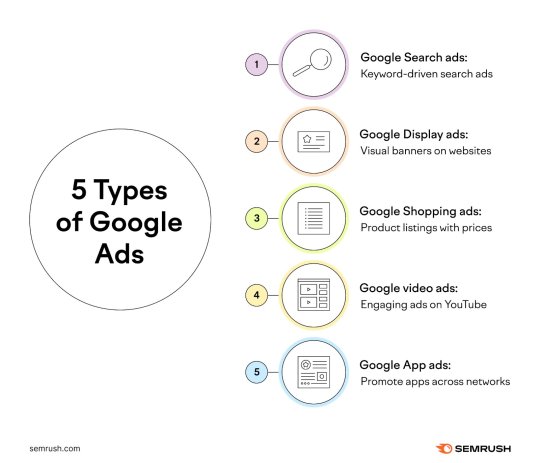
8. Keep in mind that mastering Google Ads according to your unique needs requires dedicating time, focus, and financial resources to practical learning for at least 1-1.5 years.
Initially, you may experience losses, but these are investments in your learning journey. Patience is a must.
You can also accelerate your progress by enrolling in paid courses led by experienced mentors who provide valuable insights, strategies, tips, hacks, and support, enabling you to confidently excel.
“Google Ads have an ROI of $8 for every $1 you spend” – Semrush
In conclusion, yes, learning Google Ads is hard. But with dedication and access to the right learning resources, it becomes much more manageable.
Take advantage of the available learning materials provided by Google and don't be afraid to experiment with different campaign types and strategies.
With practice and continuous learning, you'll soon become proficient in running successful Google Ads campaigns.
Here's related information that you may also find helpful – Google Ads Leads vs Website Traffic [See the Showdown]
0 notes
Text
youtube
Google ads經常改版,現在有最細的教學了,不錯呢~
0 notes
Link
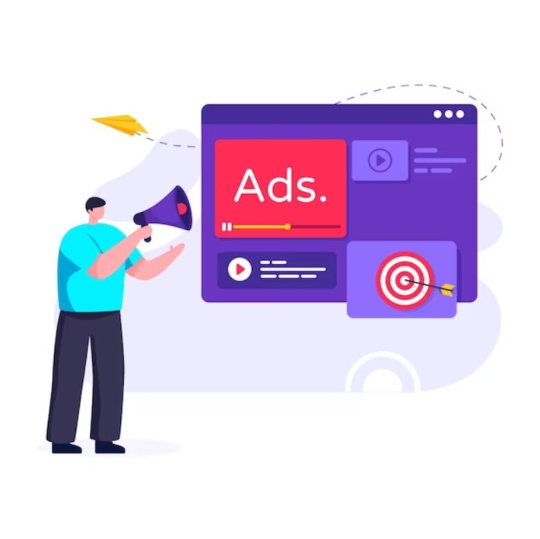
Dynamic search ads are a type of search that allows you to automatically create and target ads based on the content on your website. You can use them effectively, so long as you know what services to emphasize and what pages to direct your traffic towards. Using them is one of the easiest ways to reach out to potential customers on Google.
Of course, when considering any new form of advertising, there will be positives and negatives. So, let’s go through the pros and cons of Dynamic search ads -
Pros -
It comprehensively covers more keywords.
Dynamic search ads have several alternate targeting settings.
Ad creation and management are simplified by turning on dynamic search ads.
Cons -
They require impeccable SEO.
Low-quality keywords can eat up your budget.
Less control over the copy.
Dynamic Search Ads can be highly impactful for the right campaign and boost your performance to reach more valuable leads. Now, you might decide whether it's worth trying out for your business.
0 notes
Text
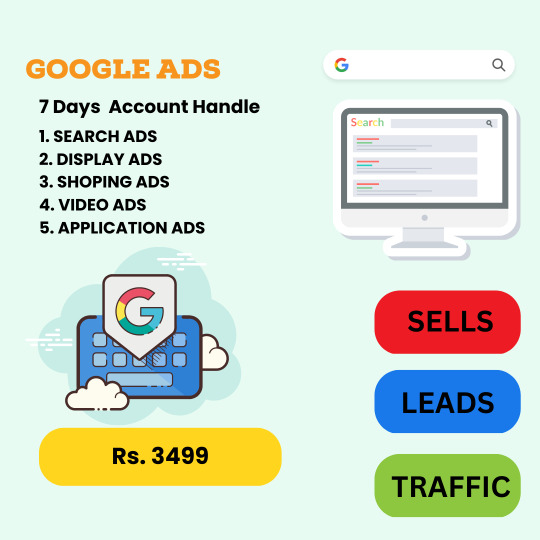
Search Engine Marketing Services
https://hellodigiweb.com/search-engine-marketing/
#Hellodigiweb#GOOGLE ADS#online marketing#Search ads#Display ads#Shoping Ads#Video ads#application ads
1 note
·
View note
Text


#david byrne#talking heads#stop making sense#I love that a24 zine#and thanks to the person on reddit who scanned it#added it to my books etc. link#need to search ebay a bit to see if someone is selling it cos the shipping from a24 was just ridiculous and I'd like to have it
4K notes
·
View notes
Text
I've started to build a bookmark file of jobsearch sites to check regularly, and part of that is looking around at employers local to Chicago. On a whim I went to the careers site of one of the larger corporations headquartered here, and while I was poking around to see what kind of requirements they have for what kind of jobs, I came across the worst tabletop campaign ever:
We’re looking for a data product expert who’s also the ultimate puzzle/dungeon master. Your quest: work with a group of diverse stakeholders to discover key problems to solve and drive consensus, adoption of data standards. The treasure? A faster, more resilient and reliable data system...
That's terrible and funny all on its own, but it gets even better when you know what Large Evil Chicago Corporation I was looking at:
McDonald's.
#job searching#I used to have a blog just for terrible stuff I found in job ads#should at least develop a tag for it this time around#DMing for Capitalism#that has a nice ring to it
2K notes
·
View notes
Text
the ace attorney fandom really has an entire day dedicated to celebrating the main character's entire life and career going to shit i love that for them
#ace attorney#jo talks#klavier guitar explosion#adding this for future search purposes don't mind me
5K notes
·
View notes
